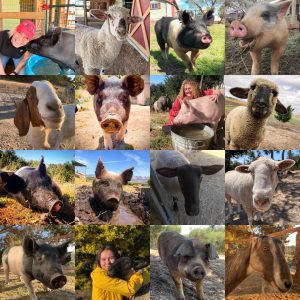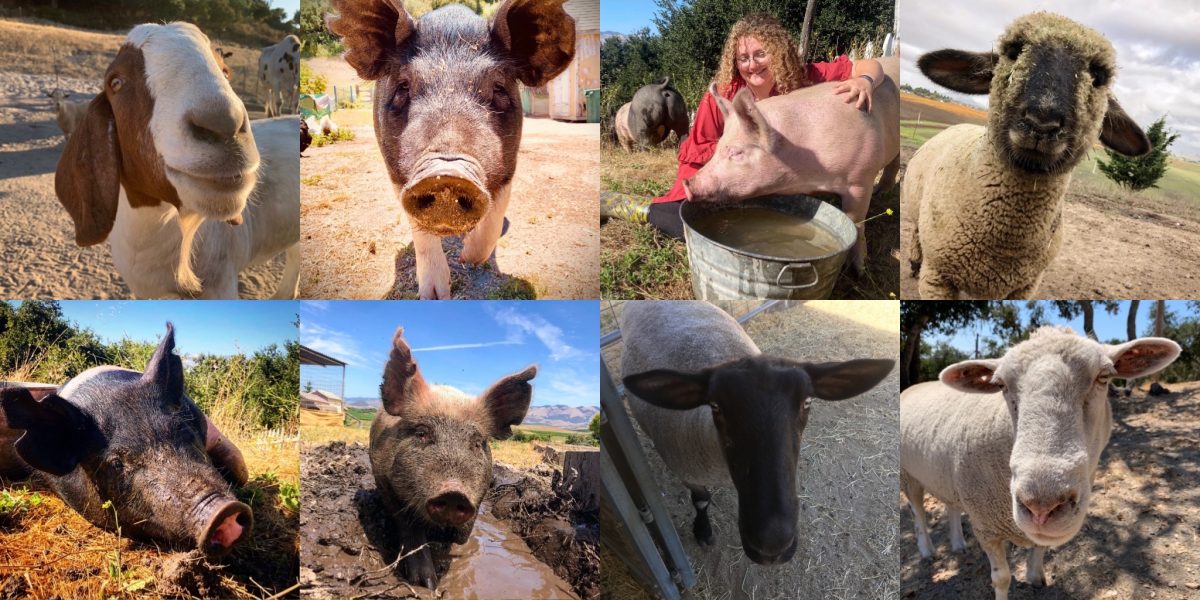Time to Rethink Animals in 4H and FFA – by Erika Satkoski, CCV Board Member
This past weekend marks the close of another livestock auction at the Mid-State Fair only this year it was a virtual one. Whether virtual or in person the outcome has the same effect; every year a significant number of students are traumatized, and young animals are killed. Well-intentioned parents and teachers support this program. However, it’s time the animal agriculture portion of 4H and FFA are reevaluated from the top down for the good of all involved.
Let me be clear: I believe both 4H and FFA are great organizations except for this one glaring problem: its use of animals. I also believe that correcting this problem is easy to do, will eliminate stress for students, death for animals, and turn around the bad publicity this relatively small portion of these organizations receive because of this.
If you follow the financial news, you’ll see the Beyond Meat company which makes plant-based foods, is currently worth nearly $8 billion, a very real indication as to what market demand for alternatives to animal agriculture products looks like right now. And this is just a beginning to this trend. This is the future. Shouldn’t 4H and FFA be preparing our students for it?
I can speak to the animal agriculture portion of 4H and FFA with confidence having seen every part of what the student experiences, from the arrival of the animals to the loading up of the animals into transport trucks at the fairgrounds. I know the animals, having several of them at my own home. I have spoken to countless students. I have spoken to teachers. I have spoken to countless parents of the students in these programs who have their own set of stressors. Parents often experience stress worrying about paying back the loan. Often the end can be heartbreaking for them, trying to support their grieving child. Parents also often bond with the animals and have feelings of loss themselves.
4H and FFA are private organizations, however, much of what they do occurs in our schools, including having their own set of classes, which result in automatic membership in the organization. Students are unintentionally blindsided when recommended “to work with animals” by school counselors and teachers. Most schools make it easier for them to sign up for this commitment by providing housing for the animals. If we know that the animal agriculture portion with such strong ties to our schools ends up traumatizing a significant portion of its students, how do we allow this to continue? How do we rationalize this? Instead, why not have the support of ALL kids and community members? I propose our schools support all students and community members by continuing with their amazing and very much needed programs in 4H and FFA but terminating the animal agriculture portion of them.
We need 4H and FFA. They provide incredible skills and training that benefit students. Most importantly we need young, bright students thinking about how we will feed our people among other great skills. They can absolutely be our heroes without involving animals in the experience.
Instead, we can teach kids to learn about animals and to help animals. We can replace all the 4H and FFA animal agriculture programs and structures with veterinary science, for example. Students who want to work with animals have many opportunities to work with animals in our community at shelters and rescue organizations. There are also many former 4H and FFA animals at our local animal sanctuaries. Students can visit or volunteer and “show” the animals there. They can show the animals how much they care and at the same time support the loving people who take care of them.

Pictured above are some of our ambassadors of hope who live at or were rescued locally and have moved to other animal sanctuaries. All were in 4H or FFA and were sent to a sanctuary or to a loving private home, not to the county fair auction where their lives would have shortly thereafter ended.
Top row:
Sebastian, Salvador, Luna and Zachary
Pictured with Luna is Tracey Soucy, Co-Founder, Loving Farm Animal Sanctuary,
All live at Loving Farm Sanctuary in Paso Robles, CA
https://www.lovingfarm.org/
Second row plus third row first two photos:
Clyde, Napoleon, Rachel, Willy, Dutchess, and Wilbur
Pictured with Rachel is Zoe Rosenberg, founder, Happy Hen Animal Sanctuary
All live at or were rescued by Happy Hen Animal Sanctuary in San Luis Obispo, CA
https://www.happyhen.org/
Third row, third photo:
Barry Lives in a loving private residence with his ewe best friend Nanette in Santa Margarita, CA
Third row, fourth photo, and fourth row:
Lilly, Buddy, Beau, Flower, and Spider
Pictured with Beau is Miranda Ross who saved Beau
All live at Lilly and Friends Animal Sanctuary in Arroyo Grande, CA



 New program to let SLO County agriculture students work with local animal sanctuary
New program to let SLO County agriculture students work with local animal sanctuary CCV “Best Of” Awards 2023 & 30 Great Plant-Based Options
CCV “Best Of” Awards 2023 & 30 Great Plant-Based Options Announcing the 2023 CCV “Best Of” Award Candidates
Announcing the 2023 CCV “Best Of” Award Candidates